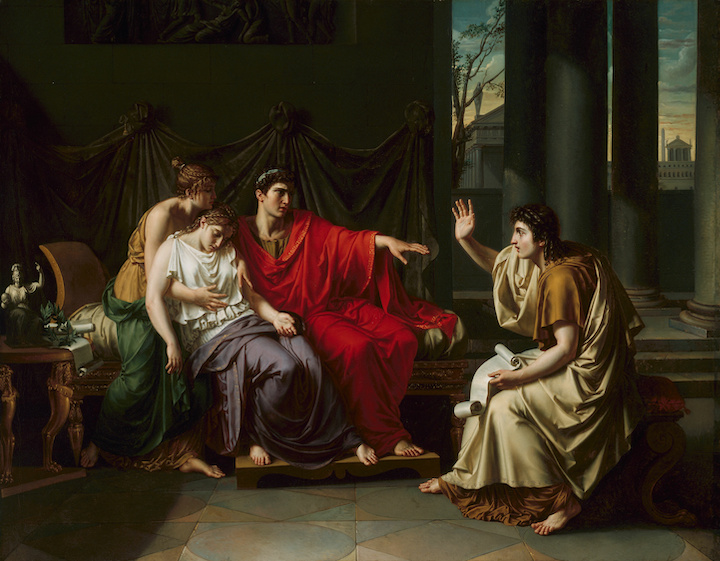In discussions of how Church and state relate, most Christians – if they bother to reflect on the question at all – are prone to treat “God and Caesar” as synonymous, Biblical terms for that relationship. “The things of God” and “the things of Caesar” are often shorthand for describing the apportionment of temporal and eternal duties, rights, and – ultimately – allegiances.
This intellectual equivalency is nothing new; it goes back a long way. My question is: Is it still valid?
It’s not that church/state or “God/Caesar” questions have lost their cogency. It’s that the intellectual frame within which at least “Caesar” has been applied has radically changed.
How so? Most basically, because – in contrast to earlier times – Caesar is now officially at least agnostic about, if not downright disbelieving, in God.
Earlier Caesars believed in God, sometimes cynically, sometimes sincerely. Regardless, they invoked a higher authority. Sometimes, they conflated that higher authority with themselves – for various reasons (not all purely nefarious). Various Caesars, from the Egyptian Pharaohs to the Roman emperors, identified as deities. Given today’s power of self-identification to make it so, even to the subversion of any real order of being or value, shouldn’t we be more tolerant of the divinity claims of little Caesars? (Divine pronouns: Thou/Thine).
Cynical or sincere, however, Caesar recognized a higher authority. In arrogating divinity to themselves, they recognized that a human title like Emperor of All the Russias was not enough. That higher authority gave them something – power, legitimacy, cachet – that their earthly identities, natures, and roles lacked.
Christendom may have led to at least notional assent to the proposition that a king was king, and God was God – and never did the twain meet. In practice, that didn’t prevent human sovereignties from reaching for the things of God. Sometimes that was explicit (e.g., claiming the right to invest bishops, a controversy both old and current). Sometimes it was implicit (e.g., l’état, c’est moi).
And sometimes, the king arrogated to himself the role of God’s “defender” as well as definer of how faith should be “defended.”
But whether rulers turned themselves into gods, decided merely to “help” the Deity with His defense, or assist Him in the ruling of His universe, the common thread was at least some acknowledgment, sincere or not, that there is a God.
Caesar no longer does even that.
I’d blame that transformation on two processes: the co-opting of terminology and “the Occidentalist heresy.”
First, co-opted words. Contemporary Polish political philosopher Zbigniew Stawrowski (Clash of Civilizations) argues that the fundamental split in modern thought is not “the West versus the rest” but “the West versus itself.” Secularized Enlightenment and post-Enlightenment thought has adopted the classical terminology of the West – words like “freedom,” “rights,” “justice,” “democracy”– but engaged in bait-and-switch.

What those terms meant, as developed through the interaction of Athens, Greece, and Jerusalem, has been altered 180 degrees (usually by eviscerating Jerusalem’s contributions), the new cuckoo’s eggs substituted in the West’s nest for its legitimate offspring.
That’s how, for example, “freedom of religion” is warped into “freedom from religion” and the switch is justified on “First Amendment grounds.”
Second, that “Occidentalist heresy.” The term comes from 20th-century Italian philosopher Augusto Del Noce. He argued that late 19th-century Western philosophers (Marx, Engels, Nietzsche) advanced the modernist conceit that “Western” society was publicly secularized. While Russia might have been the first instance where these philosophies were allowed to show their colors, Del Noce argues that the Soviets soon found the need to dress up their atheism in some form of temporal pseudo-religiosity.
Observers today note that “real” Western democracies have done what Russian Communism never did: abandon a version of a political drag show.
This is apparent in U.S. Supreme Court jurisprudence over the past 75 years and why the current Court’s reversals of that trajectory have elites in paroxysms. It was most prominently on display in cases surrounding religion and COVID.
The Caesars who imposed draconian rules against religious institutions and/or activities (and the courts that upheld them) did not think of their job as apportioning “the things of Caesar” and “the things of God.” They thought only of Caesar’s role in maintaining public order and physical life. Considerations of any other order or life being in theory beyond their ken and, in practice, irrelevant.
Caesar did not think that his subjects had any other allegiances. The ones that counted, the ones the public order would countenance, were allegiance to the “common good” and the “rule of law” deriving from “general applicability.” Good “democratic” principles required Caesar to adopt an officially agnostic, practically atheistic viewpoint vis-à-vis the religious and/or metaphysical claims of his benighted subjects appealing to a higher authority.
Once upon a time, Caesar treated (or at least feigned to treat) God as a dialogue partner, an interlocutor. Today, Caesar in theory and practice doesn’t admit there’s anybody else he need talk to.
The Judaeo-Christian tradition, of course, would never treat God and Caesar as mere “dialogue partners.” God and Caesar are not equals. Whatever Caesar has, including his sovereignty (John 19:11), comes from God. His autonomy may be real, but it is limited.
In the past, even when that subordination was only honored in theory, Caesar at least pretended to reckon with (if not to be) something beyond himself. He no longer does, not just in practice but in principle.
And that augurs the dawn of what Jacques Maritain called “the Minotaur of immanentism” in which believers are swallowed up by an all-consuming temporality hermetically sealed upon itself, insisting there is nothing more in heaven and earth than what is in its philosophy.
Believers can only answer, while they still can: non possumus.
__________















